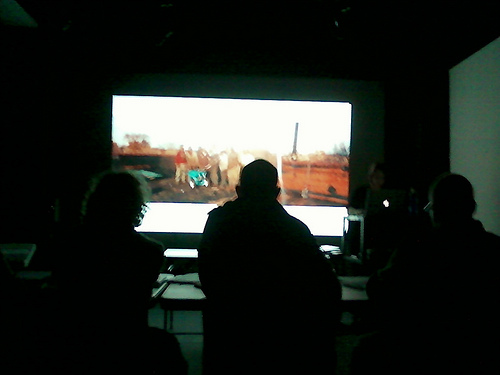
Critiques are Critical
[flickr id=”8029640016″ thumbnail=”medium” overlay=”true” size=”original” group=”” align=”none”]
Last week, the Interdisciplinary Arts department held their bi-annual Crit. Week. In the fall semester crit week, all the 3rd year MFA candidates gather to present their proposals for their thesis projects to the faculty and the rest of the student body. There are no classes on crit week, just crits (critiques).
Dr. James Elkin of the School of the Art Institute defines a critique as “an opportunity to see how your work looks to other people. The ingredients are you, your work, and people”. This being my first semester in the M.F.A. program, I did not have to present, but I thoroughly enjoyed observing.
IMPRESSION:
Attending crits was a gratifying experience for me. Granted, I wasn’t part of the faculty that had to participate in crits for two days straight, and I wasn’t one of the students getting their work torn apart. From my perspective, the students’ work was interesting, and the faculty’s feedback was clear and constructive, yet challenging.
HIGHLIGHTS:
During this time, the student being critiqued had the faculty’s undivided attention. This was a gift. There was so much great insight and advice being given out to each student that I wish I was able to record all of the faculties comments to listen to and consider how they might apply to my art practice. Luckily, all of the sessions were recorded for the individual students. Perhaps I can sneak a copy.
Attending Crits this semester was a good experience. Even though I didn’t participate in the crit this time, I learned a lot that will help me in the future. The art critique is about improving your work. It’s about becoming a better artist. The faculty is here to help me become a better artist, so I should take advantage of that resource during crits and really listen to what is being said to me about my work.
“The aim of all commentary on art now should be to make works of art—and, by analogy, our own experience—more, rather than less, real to us. The function of criticism should be to show how it is what it is, even that it is what it is, rather than to show what it means.” -Susan Sontag
[flickr id=”8029615359″ thumbnail=”medium” overlay=”true” size=”original” group=”” align=”none”]
